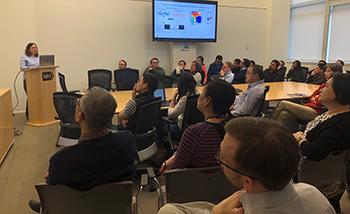The Visiting Scholar Program fosters collaboration and the exchange of ideas to help develop new therapies and improve outcomes for people with brain and spine tumors.
By Neuro-Oncology Branch Staff
April 5, 2022
Networking is an important part of oncology research. It helps develop new therapies and improve outcomes for people with a brain or spine tumor by fostering collaboration and the exchange of ideas.
The NCI Center for Cancer Research's Neuro-Oncology Branch (NOB) hosts a successful neuro-oncology lecture series called the Visiting Scholar Program. It is co-chaired by Mioara Larion, Ph.D., and Chunzhang Yang, Ph.D., both investigators at the NOB.
Since its inception in 2016, the bi-weekly program has hosted 50 renowned scholars across a variety of specialties and areas of research. Scholars give an educational lecture and then network with investigators. To date, every scholar invited to attend has accepted.
The goal of the lecture series is to prompt networking among the neuro-oncology field through discussing the latest discoveries. “As brain tumors are highly heterogeneous diseases with life-threatening conditions, brain tumor research commonly employs specialists from diversified research backgrounds—clinical, mechanistic, pharmacological, translational, and more," Dr. Yang says. "Therefore, networking is of the utmost importance."
About the Visiting Scholar Program
The visiting scholars are chosen by program co-chairs and NOB leadership based on nominations and merit. All NOB staff can nominate well-established scholars from their area of research. As a result, vastly diversified scholars have shared their research and insights as part of the program.
Between 2016 and 2020, visiting scholars came to NIH for up to two days to meet with both neuro-oncology investigators and trainees. They would then give a one-hour lecture to NOB staff and invited guests, followed by a discussion. The networking meetings enable investigators to ask their specific scientific questions and trainees to ask career-related questions.
In 2020, due to the COVID-19 pandemic, the program transitioned to a two-hour webinar. The visiting scholar lectures virtually and then meets with NOB staff and trainees privately to network. The benefit of the virtual format is that travel does not limit participation. Visiting scholars can be from all over the globe. Trainees also now take a more active role introducing the scholars before their lecture and connecting with them afterwards.
“There is a strong educational component for the trainees, as well as for those who have just entered neuro-oncology,” says Dr. Larion. “Scholars share their latest discoveries, which fosters collaborations and new ideas among more experienced investigators.”
The Success of the Program
The Visiting Scholar Program has been tremendously successful by several metrics. The program has hosted speakers in basic science, including molecular biology, immunology, metabolism, translational research, and clinical management of brain and spine tumors. Scholars from clinical specialties—such as nurse practitioners, physicians, neurosurgeons, neuro-oncologists, and epidemiologists—have also participated in the program. Visiting scholars are from national and international clinical centers, medical schools, research institutes, or the military.
“The program has brought global thought leaders in the field and related areas to NCI. It is analogous to a visiting professor at an academic institution,” says NOB Chief Mark Gilbert, M.D. “As such, members of the NOB and NIH brain tumor community have an opportunity to not only hear about ongoing research in their specific areas of interest, but they get an appreciation for the scope and depth of other areas of investigation.”
The first visiting scholar to lecture at NIH was Neurosurgery Professor Gregory Riggins, M.D., from Johns Hopkins University in Baltimore, Maryland. Other notable talks include Neuroscientist and Neuro-oncologist Michelle Monje, M.D., Ph.D., of Stanford University; Professor of Molecular Biology Matthew Vander Heiden, M.D., Ph.D., of MIT; Neurologist and Neuro-oncologist Michael Platten, M.D., of German Cancer Research Center; Professor of Neurosurgery Duane Mitchell, M.D., Ph.D., of the University of Florida; and Professor of Neuro-Oncology Victor Levin, M.D., of The University of Texas MD Anderson Cancer Center.
“The forum provides an outstanding opportunity to network and develop collaborations, many of which have already impacted our research programs,” says Dr. Gilbert. For example, Dr. Yang and his team adopted a glioma model system from physician-scientist Eric Holland, M.D., Ph.D., of the Fred Hutchinson Cancer Research Center, and the cerebral organoid model from German molecular biologist Jürgen Knoblich, Ph.D., of the Institute of Molecular Biotechnology of the Austrian Academy of Sciences.
The Visiting Scholar Program has also enabled NOB Patient Outcomes Research Program investigators and trainees to engage with scholars in the field, in order to understand their approach and the lessons they've learned. “This has resulted in collaborations on research projects, manuscripts, clinical research proposals, and grant development,” says NOB Deputy Chief Terri Armstrong, Ph.D.
“The NOB embraces collaborations with different research entities, and we hope that the Visiting Scholar Program serves as a bridge between the NOB and the neuro-oncology research field across the globe,” says Dr. Yang. As the Visiting Scholar Program continues to grow, the NOB is excited to welcome a new group of scholars to spur more impactful research ideas and advance the field.
